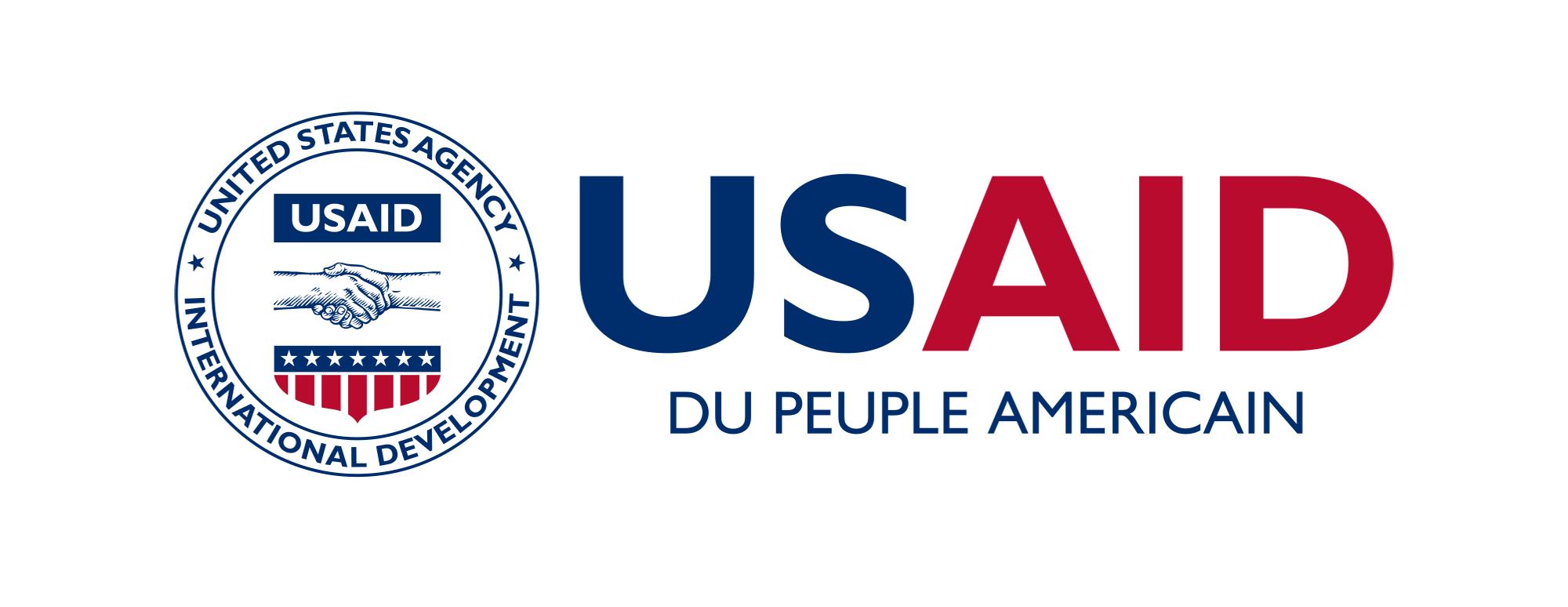By Tia Swain
Collaboration. Innovation. Transformation.
These three words punctuated each segment of “Leveraging Private Sector Engagement to Promote Sustainable Impact,” the Learning Event for USAID’s West Africa Trade & Investment Hub (Trade Hub) held on September 6-7, 2023, in Abuja, Nigeria. With the entrance to the event’s venue lined with stunning photographs artistically illustrating daily work activities and showcase tables ladened with products ranging from rice to shea butter soap, the event focused on highlighting the work, products, and achievements of the Trade Hub’s portfolio of 93 enterprises spread across the West African region. Twenty-five representatives from that portfolio joined in-person and served as the main presenters throughout the two-day hybrid event.
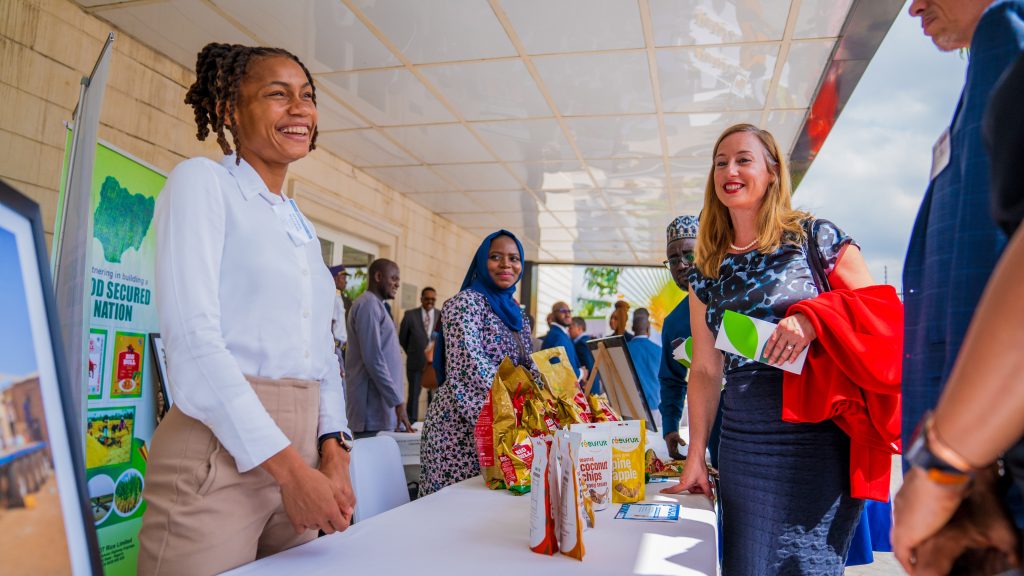
Affiong Williams, founder and CEO of Reel Fruit, the largest fruit processing, packaging, and marketing company in Nigeria, showcasing her products to USAID/Nigeria Acting Mission Director, Sara Werth.
The event’s programming began with a dynamic opening ceremony hosting USAID/Nigeria’s Acting Mission Director, Sara Werth, and the Honorable Commissioner, Ministry of Agriculture Kaduna State, Honorable Murtala Dabo who represented the Executive Governor of Kaduna State, His Excellency, Senator Uba Sani and highlighted the pivotal role that Kaduna State is playing in the success story of the Trade Hub’s initiatives in Nigeria. Their opening remarks echoed the themes of collaboration, innovation, and transformation shared by the Trade Hub’s Chief of Party, Robin Wheeler, in his welcome address.
USAID/Nigeria Acting Mission Director Werth shared, “USAID knows that addressing these challenges and advancing development outcomes cannot be solved by traditional development and government resources alone. Private sector partnerships are critical to accelerating progress; to that end, in 2019, USAID awarded the five-year West Africa Trade & Investment Hub. This innovative program supports 16 West African countries, and brings local producers, manufacturers, and the private sector together through joint investments. We are partnering to improve food security, boost employment among women and youth, build resilience to climate change, foster agribusiness competitiveness and productivity, and boost international and regional exports.”
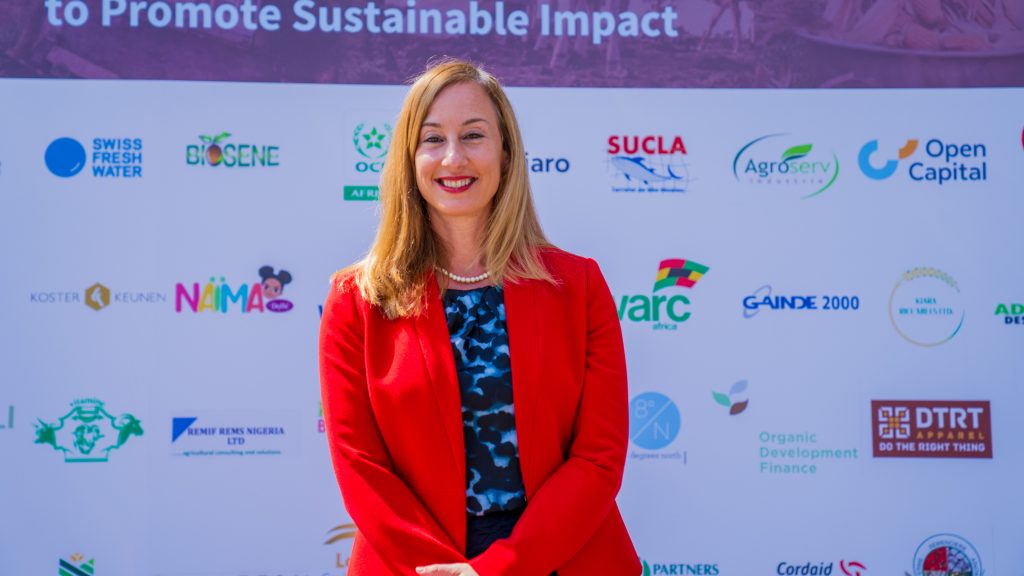
USAID/ Nigeria Acting Mission Director, Sara Werth.
Speaking for Executive Governor Senator Sani in his absence, Commissioner Dabo shared the following from the Governor’s written remarks: “The [USAID] West Africa Trade & Investment Hub is an ambitious initiative. Over the past four years, it has demonstrated an unwavering commitment to improving private sector competitiveness across the West African region. Through its blended finance and market-based approaches that champion collaboration between the public and private sectors, this initiative has catalyzed private sector investment and fostered co-investment partnerships in our region.” He continued, “We, as leaders and stakeholders, are aware of the significant role that the private sector plays in propelling our economies forward. When the public and private sectors come together in collaboration, it creates a synergy that can drive remarkable change… The impact of this initiative should not be measured only in monetary terms but in the positive transformations it has brought to people across West Africa.”
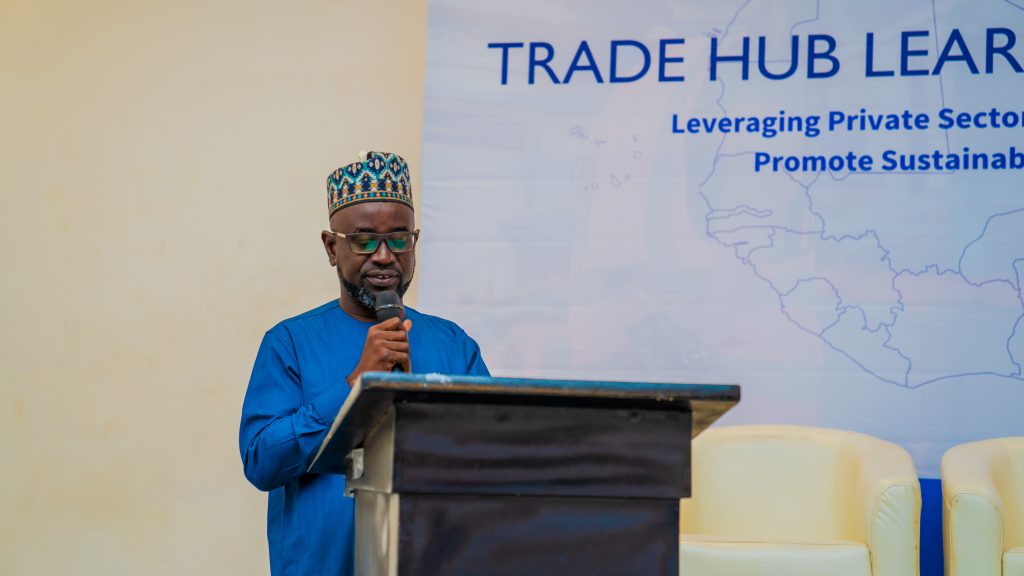
Honorable Commissioner Ministry of Agriculture, Kaduna State, Honorable Murtala Dabo, speaking during the opening ceremony of the learning event.
Taking place at Fraser Suites in the Central Business District of Abuja, the event had around 119 in-person attendees and an average of 45 daily online participants. The engaging time of sharing and learning was jointly planned by USAID’s ASSESS team, the Trade Hub team, and USAID/Nigeria’s Senior Trade and Investment Adviser, Evelyn Ayivor. Facilitated by the Trade Hub’s Communication Specialist, Tia Swain, the learning event was made up of five-panel sessions, with the topics covered on the first day being “The West Africa Trade & Investment Hub: The Power of Private Sector and Blended Finance in West Africa” and “Financing for Sustainable Development.” The representatives of the Trade Hub’s portfolio present were diverse, not only in terms of geography, but also of working in different key sectors and value chains and having varying objectives for their Trade Hub co-investment projects. With the opportunities to share their experiences and valuable insights through their presentations and their responses to questions posed by USAID, the Trade Hub, and other participants, they also benefited from the professional and personal connections formed through the many networking opportunities, including the networking reception held on the opening evening.
The first day’s first panel session entitled “The West Africa Trade & Investment Hub: The Power of Private Sector and Blended Finance in West Africa” included Habiba Suleiman of WACOT Rice (Nigeria). “It was very enlightening to learn about risk mitigation strategies from other grantees, especially across other West African countries with different sociopolitical and cultural contexts…The learning event provided an important platform that fostered a cross-fertilization of solutions, learnings, and ideas critical to achieving sustainable food security goals across the region. I particularly loved the deliberate spotlighting of women led businesses and projects during the event,” Suleiman shared.
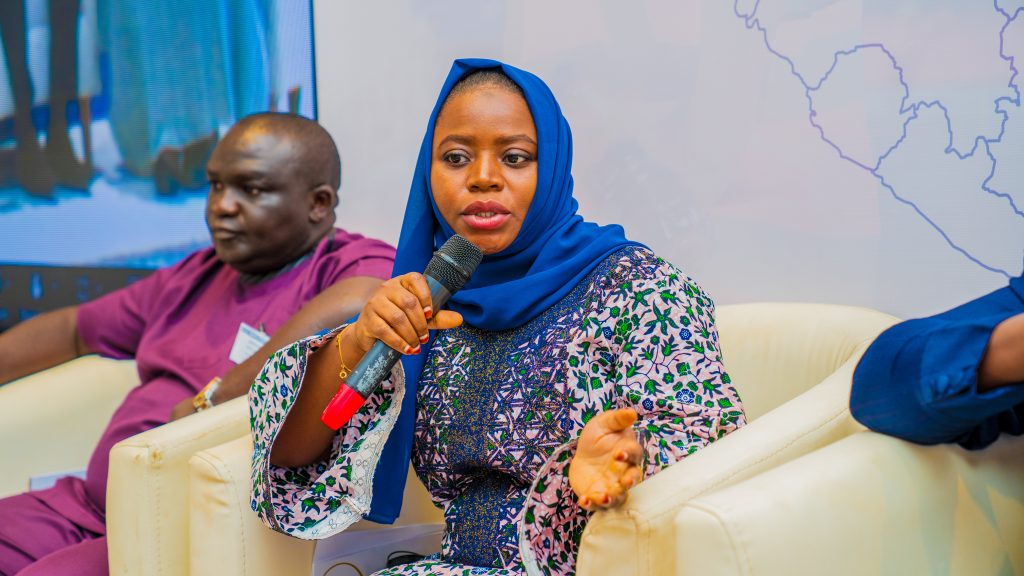
WACOT Rice Limited, Habiba Sulaiman speaking during a panel session.
Gustav Bakoundah, Founder and CEO of Label d’Or (Togo), who called the event an “executive masterclass,” participated as a panelist during the two-day event. “I learned a lot from the event’s overall strategy; in fact, it wasn’t the Trade Hub who produced the reports, but [they] left it up to each grantee to produce their own report with all the possible criticisms. What could be more concrete and realistic, than that?”
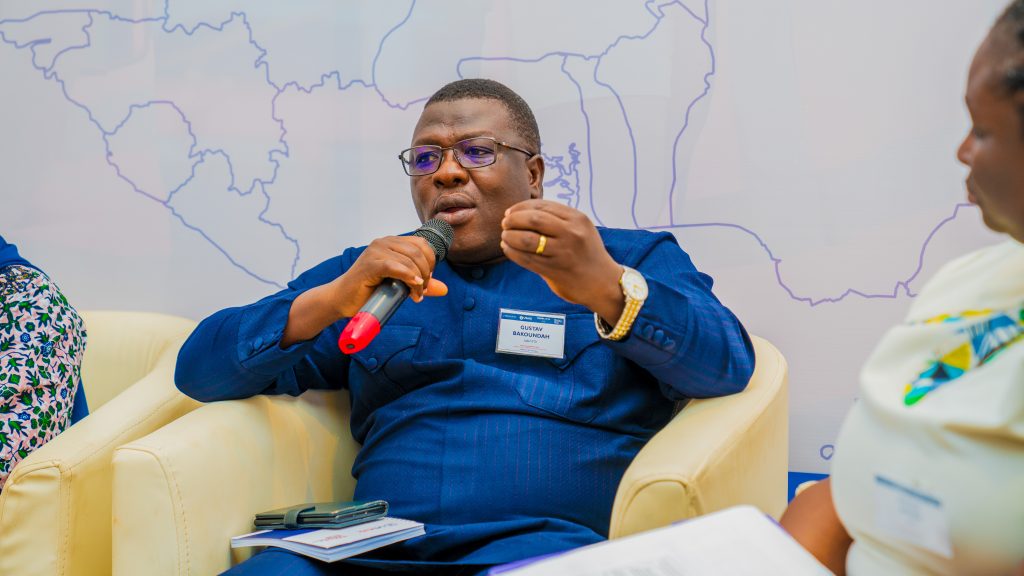
Label d’Or’s Gustav Bakoundah, speaking as a panelist.
Bakoundah shared as he reflected on the event. “What’s more, the fact that the Trade Hub let us [participants] live the story of each grantee helped us discover the different contexts of each grantee, but also reminded us that being an entrepreneur is all about rising to challenges…and the networking opportunities couldn’t have been better. I intend to apply this same methodology in my next meetings with my teams and especially my women’s cooperatives.”
The final panel discussion underscored a major objective for every Trade Hub co-investment project and the initiatives undertaken to overcome the varied cultural and societal norms in the region—“Advancing Gender and Social Inclusion: Women Role Models.” The program wrapped up with an opportunity for participants to learn the results of the Trade Hub’s mid-term evaluation conducted by USAID ASSESS (whose contributions made the event possible and successful) and to provide recommendations to influence the Trade Hub’s upcoming work.
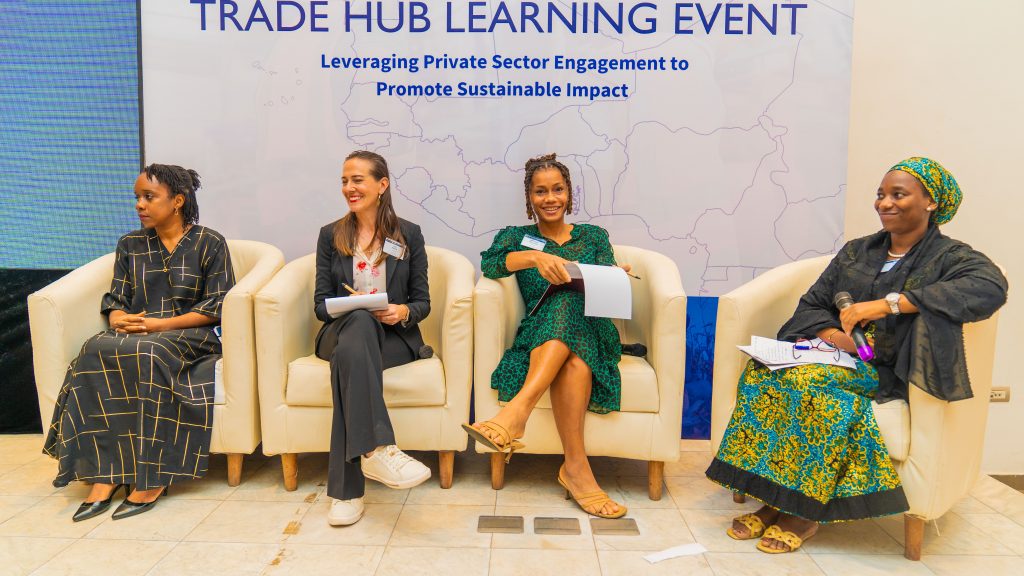
Cross-section of panelists during the Panel section entitled “Advancing Gender and Social Inclusion: Women Role Models” moderated by USAID/Nigeria Project Management Specialist-Livestock, Hafsat Grema.
Through engaging presentations and multimedia displays, panel discussions, opportunities for networking, and knowledge sharing, all attendees had the opportunity to further leverage the investments of the major stakeholders to continue the work of sustainable development. The time proved to be incredibly beneficial—even for the event’s presenters—as participants spent time together exploring the pathways toward private sector investment that are impacting development in the region; learning as the co-investment partners shared their success in leveraging the Trade Hub funds to unlock new private investment; and gleaning from the strategies they implemented to navigate challenges and crises (including COVID-19, insecurity, and inflation).
Since the Trade Hub was launched in 2019, the Activity has catalyzed 93 private-sector investments across West Africa through partnerships with the private sector, resulting in locally led initiatives being implemented in 16 countries. Made possible through the support of USAID across West Africa and partially funded by the U.S. Government’s Prosper Africa and Feed the Future initiatives, the Trade Hub has awarded $82.6 million in co-investment grants to these companies, thus far catalyzing over $319 million in new investments and creating over 60,000 jobs. In the words of His Excellency, Senator Sani of Kaduna State regarding the Trade Hub’s results in Nigeria, “Beyond the numbers, these figures represent hope, opportunity, and progress for many households across our nation and the entire West African region.”
These successes and achievements, which were captured attractively and highlighted effectively during the enriching experience, made evident the undergirding collaboration, innovation, and transformation that have played a significant part in reinforcing sustainable business foundations that impact long-term development. The hope and goal are that these efforts continue to support a prosperous West Africa with improved food security, profitably employed women and youth, enhanced resilience to climate change, a more competitive agribusiness environment, and greater international and regional exports.
Please review the Learning Event’s landing page, which houses the event’s brochure and a curated collection of multimedia materials, for more details about the Trade Hub and its key objectives, the event, and the event’s participants, namely, the Trade Hub’s co-investment partners.
